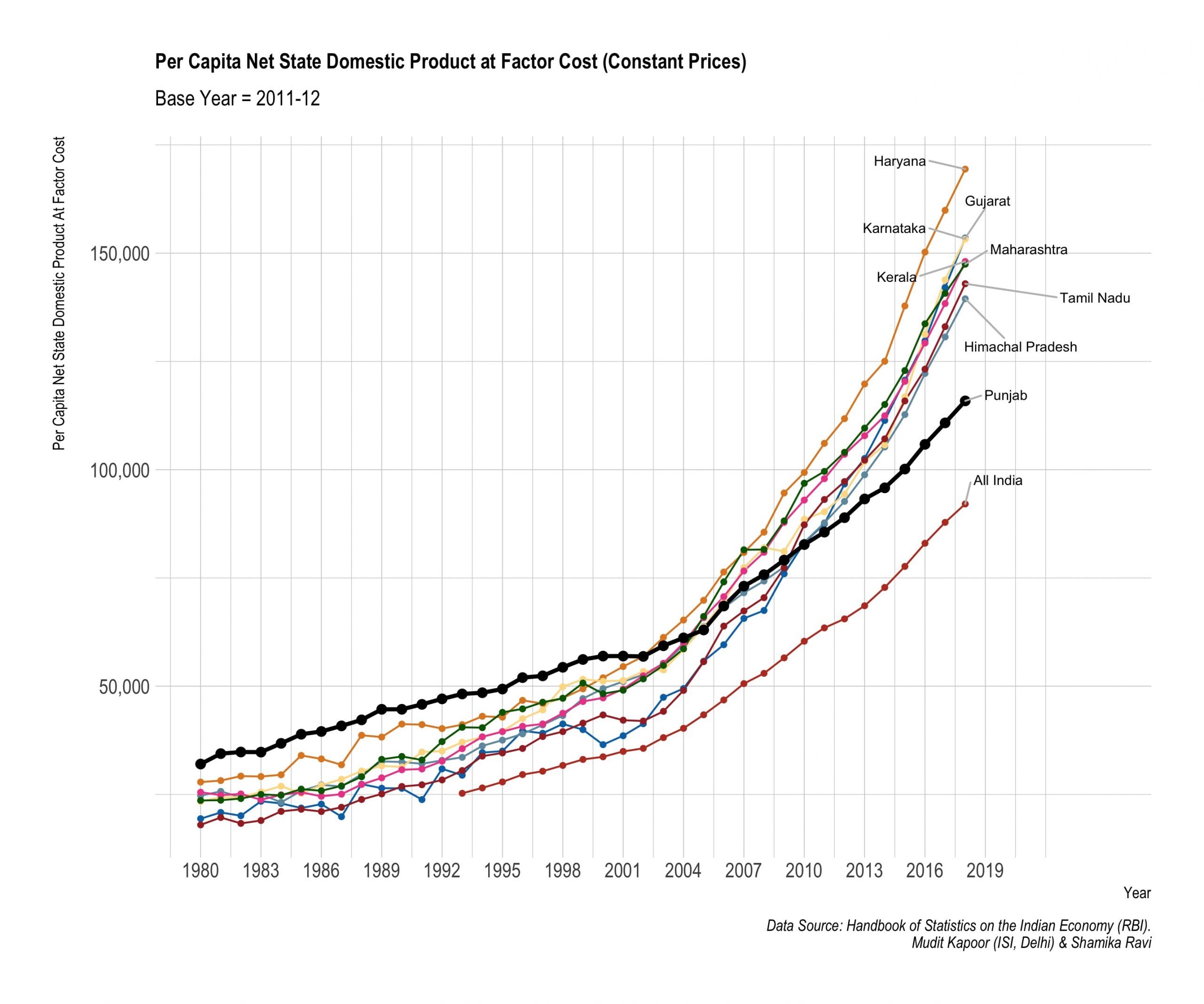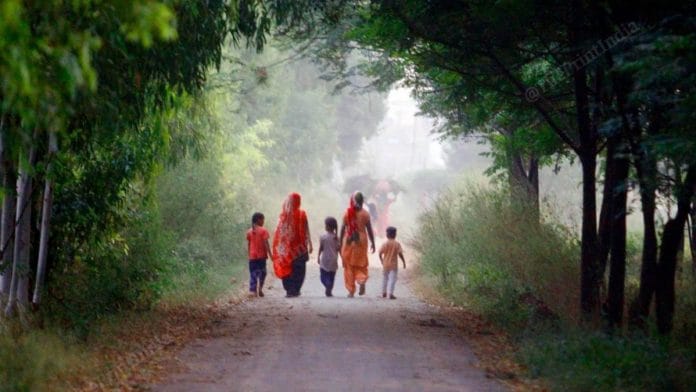Punjab is hurting. The bread basket of India was the richest state in the country for decades before it began falling behind several states, more notably its neighbours. Other than Delhi and Goa, Punjab was the most affluent state, growing on the back of the Green Revolution for decades. India’s modern economic growth since liberalisation in 1991, and more significantly from the NDA-1 years, saw all states make tremendous gains. There was an overall lifting of the economic tide with pro-growth reforms and major investments into infrastructure across the country.
Many states that were significantly poorer than Punjab until early 2000s – Haryana, Gujarat, Himachal Pradesh, Maharashtra, Karnataka, Tamil Nadu and Kerala – quickly overtook it by achieving major economic growth. Not only did Punjab fall behind these states, but the gap widened greatly with time, such that today, an average Haryanvi is 1.5 times richer than an average Punjabi.

There is a large literature that explains the unsustainable nature of Punjab’s agriculture, both from economic and ecological perspectives. The changing nature of India’s overall economy, rising agricultural productivity across other states and improved procurement and distribution capacity mean that food security is no longer an overwhelming concern as it once used to be. Several scholars have highlighted these issues with insightful detail over the years.
In his overall research and frequent columns recently, India’s leading agriculture economist Ashok Gulati has emphasised the need for Punjab farmers to diversify away from minimum support price (MSP)-based paddy and wheat towards high value crops and livestock. But ultimately, given relative productivity, the share of the agriculture sector declines with increasing share of manufacturing and services in output and employment over time. Punjab, unfortunately, has witnessed widespread de-industrialisation, particularly since 2010.
Also read: Farmers and labourers over a privileged few – India is finally going the right way
Exit of firms, entry of unemployment
Manufacturing clusters of Jalandhar, Gurdaspur, Mandi Gobindgarh and Ludhiana have been struggling over time and reported lack of growth and rampant closures. One of the major reasons for this is the non-competitiveness of Punjab compared to other Indian states. Several states, including neighbouring Himachal Pradesh, Jammu and Kashmir, and Uttarakhand have improved their ease of doing business environment and offered incentives such as 100 per cent income tax and excise exemption, subsidised working capital loans, etc.
There has been significant relocation of small and medium-scale firms from Punjab to other Indian states in the last 15 years. These have included a large number of pharmaceutical firms to Himachal Pradesh, and cotton yarns, garments and woollen firms to Madhya Pradesh. Similar trends have been experienced in the bicycle industry and sports equipment. Cheap imports from China have only made matters worse and escalated the process of de-industrialisation across Punjab. Quite ironically, instead of competing to retain industry, Punjab has witnessed further increase in cost of doing business over time. One major factor in this is the cost of cross-subsidisation of power to the state’s farmers.
An immediate impact of de-industrialisation and plateauing agricultural growth has been the high unemployment rate. Punjab’s unemployment rate is higher than the national average; the state also has higher youth unemployment levels. The latest economic survey of Punjab highlights the mismatch between job opportunities and aspirations of the youth there, leading to more and more farmers selling land to finance their children’s migration to Canada, Australia, the UK, and the US.
Also read: Indian farmers want parity, not charity. Modi govt would do well to not teach them agriculture
Rising mental health problems
A deeply worrying trend that has emerged in the last two decades is of growing mental health problems in Punjab. The latest National Mental Health Survey (2016-17) found that the total lifetime prevalence of mental illnesses in Punjab was 18 per cent, significantly higher than the national level. In absolute numbers, there are more than 20 lakh people in the state who are afflicted with mental illness and a majority of them don’t have access to treatment.
This is strongly correlated to alcoholism and substance abuse. The prevalence of alcohol dependence is 6 per cent in Punjab, more than twice the national average, while substance abuse is 2.5 per cent, more than four times the national average. The National Sample Survey Office (NSSO) data on health expenditures shows that Punjabi households have a higher out-of-pocket health expenditure burden than an average Indian household, and also that they rely heavily on exclusively private healthcare for their needs. These strongly suggest the urgent need of raising public health spending in the state.
In the midst of the Covid-19 pandemic, the alarm bells are ringing particularly loud for Punjab – the state with the highest and still rising case fatality rate. CFR in Punjab is more than twice the national level. And more distressingly, it is showing no sign of decline even as the CFR is falling nearly everywhere else in India.
Also read: Farmers draw up draft law for govt, demand guaranteed MSP & to make purchase below that a crime
Deep in debt
Unfortunately, Punjab state finances have been fragile for past several years. The latest RBI State Finances Report shows that Punjab is also India’s most indebted state with debt to gross state domestic product at 40 per cent and interest payment amounting to more than 20 per cent of the state’s revenue receipts, the highest in the country. Over the years, mounting power subsidies specifically targeted to farmers, along with more recent largesse in the form of farm loan waivers etc. have all led to Punjab becoming a state with one of the highest revenue deficits in India.
The state’s tight financial situation has limited the scope for much-needed health spending as well as limited its capacity to make any significant improvements in competitiveness and productivity across any major sector of its economy.
Punjab is hurting, and beyond stop-gap policies, the sustainable solution lies in fundamental structural reforms to its overall economy and its agricultural sector in particular.
The author is an economist and former member of the Prime Minister’s Economic Advisory Council. Views are personal.







people do not want change. they want status quo. nothing will change as the recent protests indicate. of course, dynasty politics also plays its role.
Very illuminating article. Corroborates with Shekar Gupta‘a CTC posted a few days back, comparing Bohra’s profound agriculture and Punjab’s regression. The anger of the Punjabi farmers is justified but is directed at the wrong person and government. They should hold Badals and Amerinder Singh accountable for their increasing poverty.
Our problem isn’t poverty like other states. But corruption. For that mainly BJP+SAD is responsible.
Very insightful article Shamika Ravi Madam. Today Punjab is suffering with decline in agriculture due to their unsustainable Agriculture with highest use of Fertilizers. Then most of the Youth doesn’t want to do any hard work. They just want to establish superiority in terms of Non Essential Goods & lot of Pomp & Show to others.
In Punjab Communist Unions have strong hold in Rural Areas and they have made the sufficient damage to the employment & Industries as they did in West Bengal. Due to vast interests no Leader in Punjab wants to help Farmers to understand bills better and Upliftment of Small Farmers. They are struck in the claws of Powerful FPO and Big Zameendars.
How much intelligent you guys are Communists Punjab lol!
BJP+SAD are in power from long time. You guys aren’t even gonna to blame the government.
You can’t blame communists in Punjab. They never made government in Punjab. Government of Punjab, especially SAD+BJP is responsible.
It’s that simple!
You can’t blame communists in Punjab. They never made government in Punjab. Government of Punjab, especially SAD+BJP is responsible.
It’s that simple!
Believe me, it’s not that simple matter.
they don’t need any government to go through the laws instead they need reforms which are sustainable for everyone not only for their friends ,corporations
2 weeks ago, Shekar Gupta had written about how Punjab loves a fight. I had commented about that article in similar veins of this article after I did some research. Punjab was lower in GDP than Bihar with lot more water resources. Industrialization was low and high reliance on agriculture. I also mentioned about Punjabis immigrating to anywhere in India and the world where ever they are allowed. Seeing the farmer’s agitation chiefly arising from Punjab I guessed, corporate investments could suffer here. This author has brought out a lot of data points in support of why Punjab needs a fully thought out solution, not just 3 agri bills. We need constructively critiquing authors like her, every where. some day people will realize. Imagine if every news site in India carried an article like this….some one would take notice and take steps in right direction
So does India’s.
Dear The Print,
Given the health crisis the world faces today. Could u request Shamika ji to write a series on health sector ( past, present and future). Also specifically how to make it like the one in EU( if its a gold std
Kyunki, vaccine aane ke baad ,iske bare me sab bhool jayengi
Grt article…. plz write more often..
Another reason why Punjab is falling behind big time is its youth will not work hard on fields or factories but will immigrate illegally/legally to Canada/UK and drive cabs /trucks there. Punjabis find driving cabs in Canada to be superior to studying or working hard in India.
As long as fetish for Kanedda remains Punjabi youth will end up what they are doing so far – driving cabs. trucks, washing vehicles, and playing loud monochrome obnoxious music.
Exactly
Harsh Reality of Punjab Today. But interest of Akalis and Mandi’s Strong Middlemen and Big Jameendars are hampering all the progress and returns.
They are trying to make it a religious issue throughout the Punjab
can u say india is uptouching the hills and the vary of its states, just think of it not to take a single state , make a habit of asking governments or at least appropriate comments about our falling constitution, unemployment, crimes , economy , media , freedom of speak
Arguably the finest writer in the pantheon of economic writing in the country. Shamika Ravi has substance in her writing because she brings in data rather than polemical nonsense which has been a hallmark of our high-pedestal Lutyens writers (including an ex RBI governor who reportedly put sex in the sensex).
May Shamika Ravi’s tribe grow manifold, that will be good for our country. I’m just glad when I see smart people still choosing to stay in India rather than going to the US where their talents are better recognized.
Yet another great article by Shamika Ravi ji. I recently read the article by Punjab’s sitting FM. Nothing concrete which can defend the current system and oppose farm reforms. Punjabis too don’t realise this. Any punjabi aware of these realities should demand from the state and centre not subsidies for the blackhole agri which sucks up money but produces very little wealth, but a pay back in the form of more decent non agri opportunities. Just because they were pioneers of green revolution doesn’t mean they need to be stuck in that. India has moved on by leaps. Punjab needs to catch-up. If not, stop blocking delhi and holding India’s reforms to ransom.